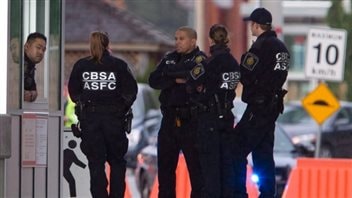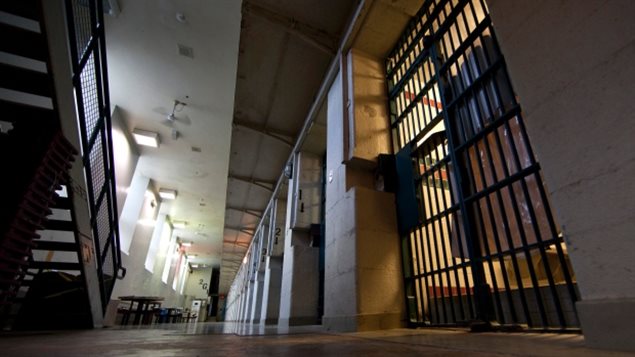‘Arbitrary, cruel and inhumane treatment’
Canada’s imprisonment of migrants amounts to arbitrary, cruel and inhumane treatment, concludes a report by the University of Toronto’s International Human Rights Program. Entitled We have no rights, the report found more than 7,300 people without legal status in Canada are detained either in immigration holding cells or maximum-security jails, sometimes for years.
These include people who may have entered the country without papers, as asylum-seekers often do, or people who have lived in Canada for years, but have never regularized their status. . Even though they are not serving a criminal sentence, they are incarcerated due to what the report calls “shocking gaps” in the rule of law.
‘A legal black hole’
“While they are meant to have the same rights as Canadian citizens, in practice, what we found is that they don’t,” says Renu Mandhane, executive director of the International Human Rights Program. “One of the key areas where we found a legal black hole is where migrants who are kept in a holding centre are transferred to a jail. There’s actually no rules, regulations or criteria in law as to why you might be transferred to a jail.”
It is often migrants with mental health or other serious health issues who are transferred, says Mandhane. And further research found that the Canadian Border Services Agency (CBSA) claimed that these migrants could access better health care and treatment in jail while “in Canada, (we) know that mental health treatment in a provincial jail is woefully inadequate,” she says.
ListenWhat amounts to ‘indefinite detention’
“We really found that detention had a very significant negative impact on people in jails. And the fact that they are kept without charge and don’t know when they are going to get out, essentially makes this indefinite detention. That causes a lot of anxiety and stress.”
The treatment of non-citizens with mental health issues is in breach of Canada’s international human rights obligations, says the report, and it violates the right to health.

CBSA ‘heading towards a more para-militaristic organization’
The CBSA’s institutional culture is one that “is heading in one direction only—towards a more para-militaristic organization where the emphasis is on power and force, and less on interaction, cooperation and engagement,” says Reg Williams, a former director of CBSA immigration enforcement in Toronto.
‘Treat us like garbage’
Stark interviews with detainees are included in the report. One inmate with schizophrenia was detained for nearly three years in jail because CBSA was unable to ascertain his identity or country of origin. He told researchers, “they treat us like garbage. We had no rights at all.”
Call for oversight, limit to time detained
The CBSA must have civilian oversight or an ombudsman to whom detainees can complain, notes the report as one of 23 recommendations.
Also, people should be held for a maximum of 90 days unless the government can give a good reason for detaining them. There currently is no limit in Canada. And the law should be changed to oblige the CBSA to use the least restrictive means to deal with migrants. “Migrants who are undocumented…that is not a crime in Canada and we want to make sure these people are treated justly while Canada determines whether they need to be deported or whether they can regularize their status,” says Mandhane.
Deaths of detainees ‘an urgent problem’
One detainee died in jail just last week, she notes. “That’s not the first death. I think we know of 12 deaths of detainees. And you know the scope of the problem—when you know that there are thousands of people in jail right now for not committing any criminal offense, they’re serving effectively hard time–to me that’s an urgent problem.”
The report’s recommendations are endorsed by:
- British Columbia Civil Liberties Association (BCCLA)
- Canadian Association of Refugee Lawyers (CARL)
- Canadian Civil Liberties Association (CCLA)
- Canadian HIV/AIDS Legal Network
- David Asper Centre for Constitutional Rights, University of Toronto Faculty of Law
- Detention and Asylum Research Cluster, Refugee Research Network, York University
- End Immigration Detention Network
- HIV-AIDS Legal Clinic of Ontario (HALCO)
- Refugee Lawyers Association of Ontario
- South Asian Legal Clinic of Ontario (SALCO)
- Dr. Branka Agic, MD, PhD, Manager of Health Equity, Centre for Addiction and Mental Health (CAMH)
- Dr. Lisa Andermann, Psychiatrist, Mount Sinai Hospital; Associate Professor, Equity, Gender and Populations Division, Department of Psychiatry, University of Toronto
- Marlys Edwardh, Sack Goldblatt Michell LLP
- Barbara Jackman, Jackman Nazami & Associates, Barristers & Solicitors
- Kim Pate, Executive Director, Canadian Association of Elizabeth Fry Societies (CAEFS) and Sallows Chair in Human Rights, College of Law, University of Saskatchewan
- Dr. Stephanie J. Silverman, SSHRC Postdoctoral Research Fellow, Graduate School of Public and International Affairs, University of Ottawa







For reasons beyond our control, and for an undetermined period of time, our comment section is now closed. However, our social networks remain open to your contributions.